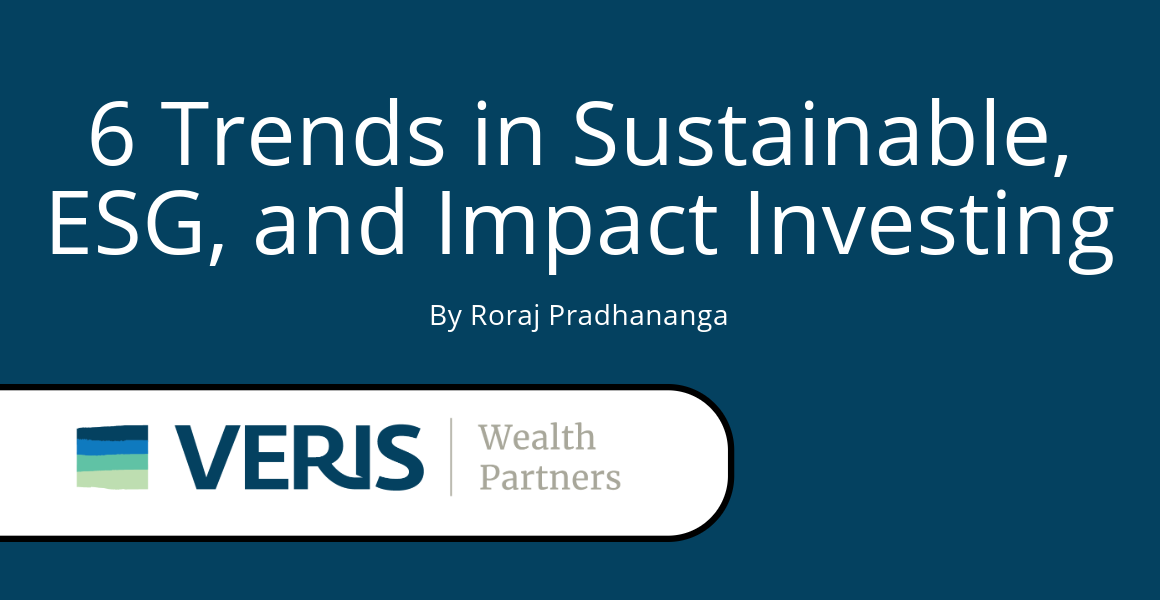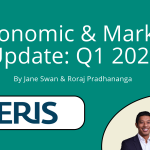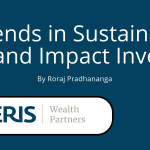Six Trends in Sustainable, ESG, and Impact Investing
Despite politicization and anti-ESG and anti-DEI rhetoric, I believe investor interest in sustainable, socially responsible, and impact investment is on the rise.¹ The ESG and impact investing industry continues on a path to the mainstream, as I predicted in my last article on impact investing trends in 2022.
I still believe now, as I did then, that ESG and DEI mitigate risk and help identify long-term investment opportunities and returns. A growing number of investors seem to share that belief.
From what I am seeing, more and more asset owners are asking advisory firms how they can align 100% of their assets with their values. According to a recent poll conducted by Morgan Stanley Institute for Sustainable Investing and Morgan Stanley Wealth Management, 77% of individual investors globally are interested in investing in companies and funds that aim to achieve market-rate financial returns while also considering positive social and/or environmental impact and 54% say they anticipate increasing allocation to sustainable investments in the next year.²
Where will these trends lead? Here are six topics that I believe will shape the sustainable and impact investing industry in 2024 and beyond.
Regulatory Changes
Topics like climate and socio-economic challenges will be on the ballot in 2024 as ~49% of the global population – including voters from over 64 countries – head to the polls.³ The outcomes of these elections will help determine the policies that will either be favorable or unfavorable to sustainable investing.
We have already seen policy tailwinds in the past two years. The US SEC adopted the Climate Disclosure bill on March 6, 2024, which requires standardized disclosures and assurance requirements on material Scope 1 and 2 emissions as well as climate related risks and risk management that can have significant impact on business strategy, operations and financial outcomes, which will help investors in decision making.
The SEC’s Climate Disclosure bill doesn’t require Scope 3 emissions reporting and deviates from the EU Corporate Sustainability Reporting Directive (CSRD) and California’s climate disclosure bills: SB-253 (Climate Corporate Data Accountability Act) and SB-261 (Greenhouse gasses: climate-related financial risk). However, the EU’s CSRD requires disclosures on double materiality (both financial and impact) that cover various environmental, social and governance topics including Scope 1, 2 and 3 emissions and this will apply to over 50,000 public and private companies including many US companies.⁴ I believe all these, including the International Financial Reporting Standards Foundation’s disclosure recommendations, will further enhance standardized disclosures and will help facilitate an apples-to-apples comparison of companies. However, we need convergence and harmonization of these various requirements so that companies are clear on reporting requirements globally.
To use ESG and DEI or not to use ESG and DEI
Election year brings heightened focus on ESG and DEI and many large investment firms have stopped using these two terminologies or are walking back their climate and DEI commitments.⁵ But some corporations are still indicating why ESG and DEI are important to them, and consumer demand is clear on sustainable products from sustainable companies.⁶ Corporates are continuing with their efforts in identifying material ESG factors and making changes to their policies, practices and operations to improve their financial outcomes. In a survey conducted by KPMG in early 2024, a significant number of CEOs named “executing ESG initiatives” as their top operational priority over the next year and a majority of those executives said that they expect to see significant returns from their investments in sustainability within the next three to five years.⁷
The SEC adopted the Names Rule in 2022 which requires funds that use ESG in the name to invest at least 80% of the value of its assets in alignment with ESG factors.⁸ There have been similar regulations in Europe which have helped asset allocators identify sustainable funds that are intentional and authentic and improved the rigor of funds that invest in sustainable companies. The silver lining is that this helps funds and managers that are authentic and intentional about ESG and DEI stand out and continue to innovate. At Veris, we continue to use these terminologies.
Intersectionality of Climate, Racial & Gender Equity, and Economic Justice
Climate solutions and getting to net zero emissions continues to be an important topic for many impact investors on the back of one of the hottest years on record along with higher frequency and severity of weather conditions including hurricanes, flooding, heat waves, drought etc. and wildfires in 2023. However, we cannot look at climate solutions as a standalone impact area.
The climate crisis impacts certain communities, including women, people of color, coastal and low-and moderate-income communities, more than others.⁹ The elderly, women, children, and blue-collar workers are impacted more by heat waves or other severe conditions.¹⁰ Some insurance companies have decided to not insure homes in California and Florida. This will impact low- and moderate-income communities more as competition decreases.
At Veris, we look at the intersectionality of climate, racial & gender equity and economic justice through the lens of a Just Transition Investment Framework. Innovation and allocation to investments that aim to mitigate or adapt to climate change and efforts designed to ensure that members and communities that are disproportionately affected by climate risks are part of the decision-making process and participate in the economic upside will be critical over the coming decades. We are excited about the allocation of the Greenhouse Gas Reduction Fund from the Inflation Reduction Act and the current administration’s Justice 40 initiatives that we believe will help us achieve a Just Transition.
Artificial Intelligence (AI) and Sustainable Investing
AI and generative AI seems to be the topic that every investor wants to talk about given the meteoric rise in the stock price of Nvidia and valuation of Open AI and peers. The euphoria around generative AI has propelled the global stock market forward and many private market funds are also investing in AI opportunities.¹¹ This raises questions around various topics like morality and ethics in AI and technology, impact on jobs and productivity, discrimination against communities of color, data privacy, the use of biometric data, copyright infringement, surveillance state, fake news, manipulated elections, fraud, etc. The EU has proposed an AI Act around governance framework for ethical AI product development and model training.¹²
AI could shape the future of sustainable investing. AI can enhance sustainability reporting and data analytics and due diligence, help with implementation of corporate ESG strategy, operational efficiencies and drive reduction in consumptions and GHG emissions through acceleration in science and new materials, etc. However, we are in the early innings of the rollout of AI, and we believe we need robust governance structures to ensure that the use of AI results in an equitable, just and sustainable world.
The Future of Impact Measurement and Management
Lack of transparency and trust in reported data continue to improve but there are still concerns about authenticity or greenwashing. We believe various regulations and bills mentioned earlier have helped or will help alleviate some of these concerns.
Since the EU Sustainable Finance Disclosure Regulation enforcement started in March 2021, asset managers have been required to provide more information on sustainability risks, how they incorporate environmental or social characteristics in their investments, and impact of their investment products. This has shifted the availability of data as well as rigor. Many investment managers are now reporting impact metrics and we would like them to report impact outcomes.
Standardization and assurance requirements of the SEC’s Climate Disclosures rules and various frameworks, metrics and firms that have propped up over the years have helped to verify authenticity of impact investments but much needs to be done.
Innovation
The impact investing industry has historically been innovative and collaborative. Many innovative investments products focused on employee ownership, decarceration, climate justice, regenerative agriculture, climate adaptation and decarbonization of hard to abate sectors, have come to market in recent years. These products have the potential to make an immense positive environmental and social impact.
In the last few years, Veris has adopted our EDI manager due diligence framework and the Just Transition Investment Framework which are designed to help our clients allocate their investments to create a more equitable, just, and sustainable world.
We believe that initiatives like Due Diligence 2.0, 2X Global and Tara Health Foundation’s Diverse Investing Collective have helped improve allocation to diverse and first-time fund managers. It is our view that the combination of innovative products and commitments will help tackle inequality, and other global challenges as well, through capital markets.
Veris is excited to be part of this ecosystem by working with asset owners, investment managers, and data and solution providers.
Looking Beyond 2024
We live in a world that is full of volatility, uncertainty, complexity, and ambiguity (VUCA) with wars, partisanship, and political turmoil not just in the US but globally, and anti-ESG and DEI attacks, but the trends highlighted shows that momentum is strong. I believe investors have higher conviction in ESG, DEI, and impact investing now more than ever, and I expect that both interest and momentum will continue to grow in the future.
Roraj Pradhananga is a Partner, Co-CIO, and Managing Director, Investments at Veris.
1. https://www.researchandmarkets.com/reports/5938513/impact-investing-market-global-industry-size
2. https://www.morganstanley.com/ideas/sustainable-investing-on-the-rise
3. https://time.com/6550920/world-elections-2024/
4. https://finance.ec.europa.eu/capital-markets-union-and-financial-markets/company-reporting-and-auditing/company-reporting/corporate-sustainability-reporting_en
5. https://www.nytimes.com/2024/01/13/business/dealbook/dei-goes-quiet.html
6. https://www.mckinsey.com/industries/consumer-packaged-goods/our-insights/consumers-care-about-sustainability-and-back-it-up-with-their-wallets
7. https://kpmg.com/us/en/articles/2024/kpmg-2024-ceo-outlook-pulse-survey.html
8. https://www.sec.gov/news/press-release/2023-188
9. https://www.epa.gov/newsreleases/epa-report-shows-disproportionate-impacts-climate-change-socially-vulnerable
10. https://news.stanford.edu/2023/08/14/heat-affects-vulnerable/#:~:text=Extreme%20heat%20threatens%20the%20physical,can%20also%20spark%20climate%20anxiety.
11. https://www.forbes.com/sites/neilsahota/2024/02/07/futuristic-finance-ais-seductive-power-in-reshaping-private-equity/#:~:text=Some%20private%20equity%20firms%20have,identify%20and%20evaluate%20potential%20investments.
12. https://digital-strategy.ec.europa.eu/en/policies/regulatory-framework-ai
Disclaimer
The information contained herein is provided for informational purposes only and should not be construed as the provision of personalized investment advice, or an offer to sell or the solicitation of any offer to buy any securities. Rather, the contents including, without limitation, any forecasts and projections, simply reflect the opinions and views of the authors. All expressions of opinion reflect the judgment of the authors as of the date of publication and are subject to change without notice. There is no guarantee that the views and opinions expressed herein will come to pass. Additionally, this document contains information derived from third party sources. Although we believe these third-party sources to be reliable, we make no representations as to the accuracy or completeness of any information derived from such third-party sources and take no responsibility, therefore.








